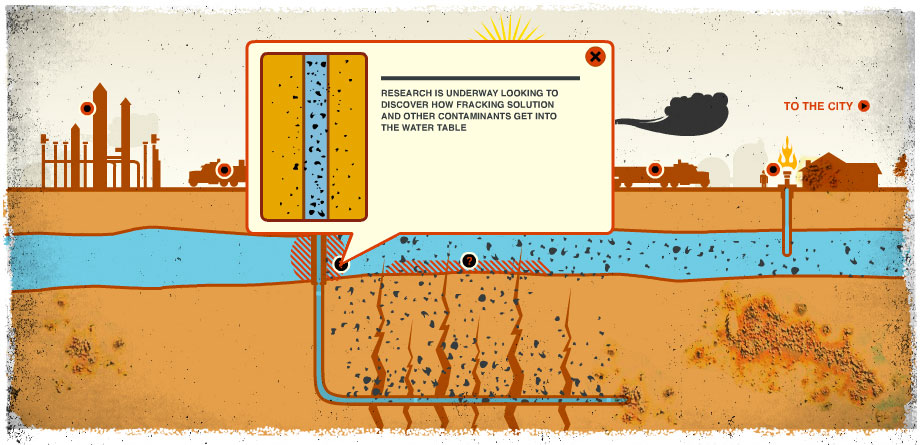Water pollution from fracking confirmed in multiple states Pennsylvania, Ohio, West Virginia and Texas have received hundreds of complaints, an AP investigation revealed
LINDSAY ABRAMS
Salon.com
For a process that’s driving America’s energy boom, the things we don’t know about fracking for oil and natural gas often seem to surpass that which we do. One thing we do know: It involves pushing gallons of chemical-laden water into the ground, which has the potential to seep into nearby sources of drinking water. Leaving aside the fact that gas and oil companies aren’t required to disclose exactly which chemicals they’re using, actual information about water contamination’s scope and severity, along with other details crucial to public knowledge and health, is hard to come by.
In states at the forefront of the past decade’s boom in drilling for gas and oil, the Associated Press found hundreds of complaints about well-water pollution, a number of which were confirmed by officials:
— Pennsylvania has confirmed at least 106 water-well contamination cases since 2005, out of more than 5,000 new wells. There were five confirmed cases of water-well contamination in the first nine months of 2012, 18 in all of 2011 and 29 in 2010. The Environmental Department said more complete data may be available in several months.
— Ohio had 37 complaints in 2010 and no confirmed contamination of water supplies; 54 complaints in 2011 and two confirmed cases of contamination; 59 complaints in 2012 and two confirmed contaminations; and 40 complaints for the first 11 months of 2013, with two confirmed contaminations and 14 still under investigation, Department of Natural Resources spokesman Mark Bruce said in an email. None of the six confirmed cases of contamination was related to fracking, Bruce said.
— West Virginia has had about 122 complaints that drilling contaminated water wells over the past four years, and in four cases the evidence was strong enough that the driller agreed to take corrective action, officials said.
— A Texas spreadsheet contains more than 2,000 complaints, and 62 of those allege possible well-water contamination from oil and gas activity, said Ramona Nye, a spokeswoman for the Railroad Commission of Texas, which oversees drilling. Texas regulators haven’t confirmed a single case of drilling-related water-well contamination in the past 10 years, she said.
